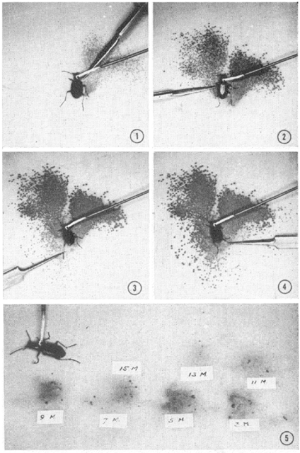Thomas Eisner facts for kids
Quick facts for kids
Thomas Eisner
|
|
|---|---|
| Born | June 25, 1929 Berlin, Germany
|
| Died | March 25, 2011 (aged 81) Ithaca, New York, U.S.
|
| Citizenship | United States |
| Alma mater | Harvard University |
| Known for | Pioneering chemical ecology |
| Awards | Newcomb Cleveland Prize (1967) Tyler Prize for Environmental Achievement (1990) National Medal of Science (1994) John J. Carty Award (2008) |
| Scientific career | |
| Fields | Insect chemical ecology |
| Institutions | Cornell University |
Thomas Eisner (born June 25, 1929 – died March 25, 2011) was a famous German-American scientist. He studied insects and how living things interact using chemicals. People called him the "father of chemical ecology."
He was a professor at Cornell University. He also directed a research center there. Thomas Eisner was a top expert on how animals behave. He also studied ecology (how living things interact with their environment) and evolution. With his friend Jerrold Meinwald, he helped start the field of chemical ecology. This science looks at how chemicals help living things communicate or defend themselves. He wrote many scientific papers and books.
Contents
Early Life and Education
Thomas Eisner was born in Berlin, Germany, on June 25, 1929. His father, Hans Eisner, was a chemist. His mother, Margarete Heil-Eisner, was an artist. His family had to leave Germany to escape the Nazi government. They first moved to Barcelona, Spain. After the Spanish Civil War, they moved to Uruguay. The Eisner family came to the United States in 1947.
Thomas Eisner became an American citizen. He applied to Cornell University for college but was not accepted at first. He earned his bachelor's and PhD degrees from Harvard University. In 1957, he joined the entomology (insect study) department at Cornell. He married Maria Eisner, who worked in his lab. In 1964, he helped create a new department at Cornell. He worked there until he passed away.
Hobbies and Interests
Besides his science work, Thomas Eisner loved nature photography. He also made videos about nature. His film called Secret Weapons won a big award at the New York Film Festival. It was also named the Best Science Film by a British science group.
He was also a talented piano player. Sometimes, he even conducted music. Thomas Eisner died on March 25, 2011. He was 81 years old.
Discoveries in Chemical Ecology
Eisner's most important work was in chemical ecology. He mainly studied how insects use chemicals to protect themselves from predators. One of his most famous discoveries was about the bombardier beetle. He found that this beetle creates a chemical reaction inside its body. This reaction lets it shoot a boiling, bad-smelling liquid from its rear end. This spray helps the beetle scare away enemies.
Protecting Nature
Thomas Eisner was a field biologist. This means he studied living things in their natural homes. He worked in many different parts of the world. He was also very active in protecting nature.
He was part of important groups like the National Audubon Society. He also served on the council for the Nature Conservancy. He helped start a program in Washington D.C. that connected scientists with government. He worked hard to save wild areas in Florida and Texas.
Awards and Recognition
Thomas Eisner was a member of many important science groups. These included the National Academy of Sciences. He received many honors for his work. He won the Tyler Prize for Environmental Achievement. He also received the National Medal of Science in 1994. This is one of the highest science awards in the United States.
He also received special degrees from universities in different countries. In 2008, he won the John J. Carty Award. This award is given by the National Academy of Sciences for advances in science.
 | John T. Biggers |
 | Thomas Blackshear |
 | Mark Bradford |
 | Beverly Buchanan |


